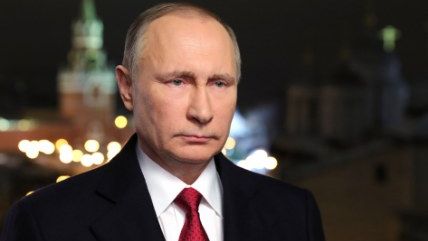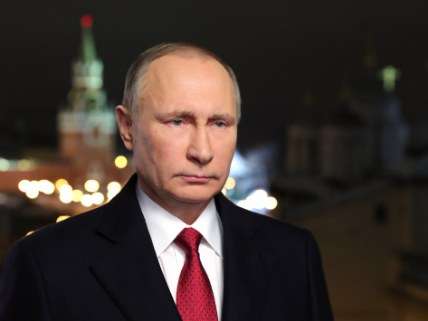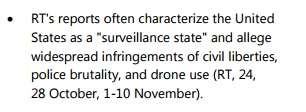Report on Russian Involvement in U.S. Election Primarily about RT Network
Coverage of third-party candidates presented as attempt to discredit American democracy.


This afternoon the Office of the Director of National Intelligence released its unclassified version of its report intended to show that the Russian government attempted to influence the outcome of the 2016 presidential election to try to help get Donald Trump elected.
Because this is the unclassified version of the report, it is extremely short on presenting actual evidence and the report up front acknowledges that it cannot reveal a lot of information for fear of revealing sources or intelligence gathering methods. Its conclusions are the same as what it is in the classified report that we will not see: The CIA, FBI and NSA are all confident that the Russian government, with the support of President Vladimir Putin, attempted to influence the outcome of the 2016 election, attempted to discredit Hillary Clinton as a candidate and erode Americans confidence in our government.
The declassified report is 25 pages long, but only a small part of it, just a couple of pages, talks about actual cyberintrusions or hacking and the role it might have played. And it's really what we've already heard. The agencies are confident that Russian intelligence gained access to Democratic National Committee (DNC) networks, collected the emails, and then released them to the public through intermediaries like Guccifer 2.0, Wikileaks, and DCLeaks.com. The agencies believe that Putin wanted to discredit Clinton because he blames her for anti-Putin protests from 2011 and 2012.
Those pages also include a bunch of reasons why they believe Putin chose Trump over Clinton that are logical but aren't exactly provable. The summary (of a summary) is that Putin believed it would be easier to advance Russia's interests with Trump rather than Clinton.
Then the report gets a little odd. All the above part takes up five pages. It is followed by seven pages of analysis of the operations of Russian-operated English-speaking news network RT (formerly known as Russia Today) and its role in spreading Kremlin-approved messaging. The goal of this section of the report is to highlight how Russian propaganda is reaching American listeners. And while it's obviously important for our intel folks to be aware of how this is all working, a look at their examples of how RT is fostering criticism of the United States government is illuminating in a way I'm not sure the intel agencies intended:


For those who can't see the images from the report for whatever reason, they point to the fact that RT hosted debates from third-party candidates and publicized the idea that the two-party system doesn't represent a third of voters. In addition, they call the United States a surveillance state full of civil liberties abuses, police brutality, and drone use.
Full disclosure here: I appeared on RT twice in 2012 to discuss a couple of instances of alleged police brutality in the Southern California area. I haven't been on since then. It became increasingly clear (especially after journalists there quit and went public about how the network actually operated) that the network was trying to slant the discussion to a sort of fatalistic "There's nothing we can do about these problems" attitude (as cynical as I am, I don't agree).
I don't dispute the findings here about RT, but look at those examples and they could apply not just to Reason but to media outlets of varying ideological positions within America. Americans are abandoning the two political parties. People are genuinely upset about surveillance and police brutality. If this is an attempt to sway the public to be concerned about RT, it's not terribly persuasive. And it's several years after the reality of what RT is came to light anyway, so it just reads rather dated.
I cannot imagine that this report will influence many people one way or the other. I said yesterday that it seems likely that Russia is behind the hack but the government will never be able to reasonably publicly prove it. This report does fall into that camp.
Which is all the more reason to focus on developing strong protections from cyberinfiltration rather than focusing so much on retaliation or a "cyberwar." If the government can't adequately prove to the public who is responsible, how can the public support responses like sanctions or even stronger action? People want to go to war over this stuff.
Read the report for yourself here.


Show Comments (278)